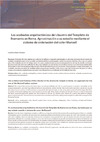Please use this identifier to cite or link to this item:
https://accedacris.ulpgc.es/jspui/handle/10553/77252
| DC Field | Value | Language |
|---|---|---|
| dc.contributor.author | Díaz Ramos, Isolina | en_US |
| dc.date.accessioned | 2021-01-19T11:46:05Z | - |
| dc.date.available | 2021-01-19T11:46:05Z | - |
| dc.date.issued | 2020 | en_US |
| dc.identifier.issn | 1989-8568 | en_US |
| dc.identifier.other | Scopus | - |
| dc.identifier.uri | https://accedacris.ulpgc.es/handle/10553/77252 | - |
| dc.description.abstract | The study of the exterior decorative layers on heritage buildings and sites is a necessary task to produce knowledge on the original stratigraphic units that have defined historical environments. Despite the fact that some works have been carried out around this subject in our country, it is still necessary to incorporate this kind of studies on the conservation works of built heritage. Therefore, a number of chromatic readings have been carried out on the walls of the cloister of Bramante Temple in Rome, in order to determine the layers, sequences and tones applied over the centuries by the use of a Munsell atlas. Results are a warm tone palette of yellows, greens, ochres, and reds. This work aims to asses and conserve architectural finishes, taking as an example the walls of the courtyard of the Bramante Temple. | en_US |
| dc.description.abstract | El estudio del color original que conforma los edificios o conjuntos patrimoniales es una tarea necesaria a fin de conocer las unidades estratigráficas que se han sucedido en la historia del bien, contribuyendo a definir los entornos históricos. Pese a que en nuestro país se han realizado una serie de trabajos sobre este sujeto, continúa siendo necesaria la incorporación de este tipo de estudios en trabajos de conservación del patrimonio edificado. Por ello, se han realizado una serie de lecturas cromáticas sobre los muros del claustro del Templete de Bramante en Roma empleando un atlas Munsell, a fin de determinar los estratos, secuencias y tonos aplicados a lo largo de los siglos. Los resultados muestran una paleta de tonalidad cálida compuesta por amarillos, verdes, ocres, y rojos. Este trabajo pretende poner en valor y conservar los acabados arquitectónicos, tomando como referencia los muros del patio del Templete de Bramante. | en_US |
| dc.language | spa | en_US |
| dc.relation.ispartof | Ge-Conservacion | en_US |
| dc.source | Ge-Conservacion [EISSN 1989-8568], v. 18, n. 1, p. 69-81, (Diciembre 2020) | en_US |
| dc.subject | 550601 Historia de la arquitectura | en_US |
| dc.subject.other | Architectural Finishes | en_US |
| dc.subject.other | Colour | en_US |
| dc.subject.other | Colour Matching | en_US |
| dc.subject.other | Conservation And Documentation | en_US |
| dc.subject.other | Lime Mortar | en_US |
| dc.subject.other | Munsell System | en_US |
| dc.subject.other | Painting Stratigraphy | en_US |
| dc.subject.other | Stratigraphic Units | en_US |
| dc.subject.other | Color | en_US |
| dc.subject.other | Unidades estratigráficas | en_US |
| dc.subject.other | Sistema Munsell | en_US |
| dc.subject.other | Mortero | en_US |
| dc.subject.other | Estrato pictórico | en_US |
| dc.subject.other | Lectura cromática | en_US |
| dc.subject.other | Acabados arquitectónicos | en_US |
| dc.subject.other | Conservación y documentación | en_US |
| dc.title | Los acabados arquitectónicos del claustro del Templete de Bramante en Roma. Aproximación a su estudio mediante el sistema de ordenación del color Munsell | en_US |
| dc.title.alternative | The Architectural Finishes of the Cloister of the Bramante Temple in Rome. An Approach by the Use of the Munsell Colour System | en_US |
| dc.title.alternative | Os acabamentos arquitetónicos do claustro do Templete de Bramante em Roma. Aproximação ao seu estudo usando o sistema de cores de Munsell | en_US |
| dc.type | info:eu-repo/semantics/Article | en_US |
| dc.type | Article | en_US |
| dc.identifier.doi | 10.37558/gec.v18i1.772 | en_US |
| dc.identifier.scopus | 85098873212 | - |
| dc.contributor.authorscopusid | 57204951656 | - |
| dc.identifier.eissn | 1989-8568 | - |
| dc.description.lastpage | 81 | en_US |
| dc.identifier.issue | 1 | - |
| dc.description.firstpage | 69 | en_US |
| dc.relation.volume | 18 | en_US |
| dc.investigacion | Ingeniería y Arquitectura | en_US |
| dc.type2 | Artículo | en_US |
| dc.utils.revision | Sí | en_US |
| dc.date.coverdate | Diciembre 2020 | en_US |
| dc.identifier.ulpgc | Sí | en_US |
| dc.contributor.buulpgc | BU-ARQ | en_US |
| dc.description.sjr | 0,139 | |
| dc.description.sjrq | Q2 | |
| dc.description.esci | ESCI | |
| dc.description.fecytq | Q1 | |
| dc.description.fecytpuntuacion | 57,93 | |
| dc.description.dialnetimpact | 0,0 | |
| dc.description.dialnetq | Q1 | |
| dc.description.dialnetd | D2 | |
| dc.description.erihplus | ERIH PLUS | |
| item.grantfulltext | open | - |
| item.fulltext | Con texto completo | - |
| Appears in Collections: | Artículos | |
SCOPUSTM
Citations
2
checked on Jun 8, 2025
WEB OF SCIENCETM
Citations
1
checked on Feb 8, 2026
Page view(s)
54
checked on Oct 15, 2023
Download(s)
63
checked on Oct 15, 2023
Google ScholarTM
Check
Altmetric
Share
Export metadata
Items in accedaCRIS are protected by copyright, with all rights reserved, unless otherwise indicated.
